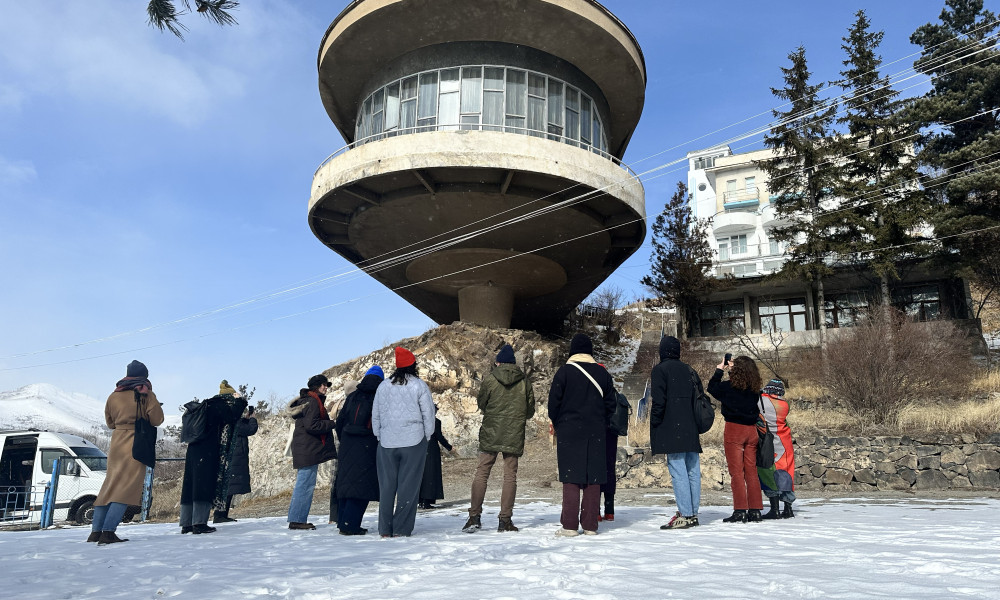February 2025
At the beginning of February, CSN Lab welcomed the Armenian phase of the (Dis)Solutions: Decolonial Encounters Residency program, organized by Goethe-Institut.
The (Dis)Solutions is a multi-phase program designed to explore post-colonial practices in art, culture, and civil society, amplifying the voices of marginalized communities across Central Asia, the South Caucasus, and Eastern Europe. By fostering cross-regional artistic exchanges, the exchange program creates a platform for collaboration and dialogue across borders. CSN Lab hosted the Armenian part of the South Caucasus Residency chapter of the program, which covers Armenia and Georgia.
From February 5 to 11, a diverse group of artists, curators, and cultural practitioners from Germany, Kazakhstan, Kyrgyzstan, Latvia, Lithuania, Moldova, Romania, Tajikistan and Ukraine came together to engage with Armenia’s artistic landscape through the perspective of decoloniality. The residency aimed to immerse the artists in Armenia’s cultural contexts through engagement in the artistic and cultural landscape of the country.
The program began with a welcoming session at CSN Lab in Yerevan, setting the stage for a week of exploration and exchange of ideas. To provide a comprehensive understanding of Armenia’s cultural landscape, CSN Lab facilitated visits to a diverse range of organizations, including active grassroots initiatives, various art collectives, and cultural institutions. In the framework of study visits, artists had the opportunity to engage with the works of 4Plus, an organization founded by Armenian women photographers, as well as visited the Institute of Contemporary Art (ICA), where they were introduced to its educational program for artists and current exhibitions. For an even more holistic perspective on the contemporary art scene, the itinerary specially designed also included a visit to NPAK, where the participants could freely explore the institution’s legacy and experience an artist-led tour by local contemporary artist; Amasia Niziblian of her currently ongoing exhibition.
Throughout the program’s decolonial framework, it was essential to gain a deeper understanding of Armenia’s multilayered urban landscape and how its environment has been shaped by the Soviet legacy, the acts of defiance of urban activism within it, and the challenges it faces today. To illustrate the complex past further, CSN Lab organized an urban memory tour of Yerevan’s Kond neighbourhood, led by CSN Lab’s team member and architect, Arsen Abrahamyan. The tour gave an incredibly valuable insight into the city’s layered past, ever-changing urban fabric and current environmental conflicts. Many participants noted striking similarities between Yerevan and their own Post-Socialist cities, particularly in struggles against aggressive urban development, irregular transformations and gentrification.
Continuing the exploration of the remnants of the Soviet legacy and Armenia’s urban and cultural transformation, the residents visited the Writers’ House on the banks of Sevan Lake, a notable example of Soviet Modernist architecture. To further enrich their understanding of Armenia’s environmental landscape, participants also examined the critical ecological challenges facing Lake Sevan and water infrastructure of the country. Discussions delved into the consequences of past mismanagement of water resources, revealing relevant parallels of environmental concerns in the residents’ own societies. These reflections underscored the broader regional implications of environmental degradation, emphasizing the need for cross-border solidarity through art and culture.
An important objective of the residency was to foster meaningful connections between local and visiting artists. For that purpose, CSN Lab hosted a networking event bringing together artists, curators, and cultural practitioners to engage in discussions about their artistic practices, personal stories, and the role of art and culture in navigating decolonial processes. During the meeting, artist Anna Hakobian reflected on the Soviet modernist legacy through her art and shared one of her projects that was realized with the support of the CSN Lab.
Reflecting further on the impact of colonialism and the interconnectedness of current regional crises, participants acknowledged that the region is burdened with wars and challenges. Yet, even through these struggles, there remains a sense of hope among the artists for overcoming the challenges brought by colonization and amplifying decolonial voices through fostering meaningful dialogues within impacted communities.
The residency concluded with a final reflection session at the Goethe-Zentrum in Yerevan, where participants shared their insights and experiences. Discussions focused on what inspired them, what resonated most during their time in Armenia, and how these encounters would influence their future artistic endeavours. As the hosting organization, CSN Lab was delighted to learn during the reflections of the artists and curators, that our efforts to create and provide a safe and welcoming environment were very much felt amongst the participants.
Fostering dialogue is one of CSN Lab´s core values and objectives, and this program was yet another step into that direction. Through dialogue discussions of art and culture, participants not only explored the themes and complexities of decolonization but also forged new meaningful connections while reimagining our shared present and future.

